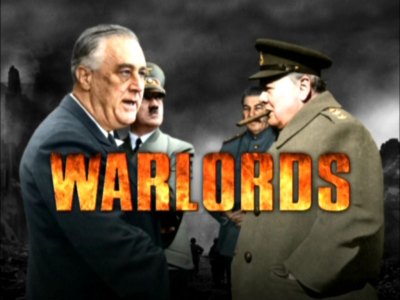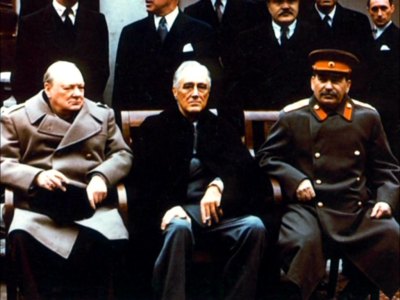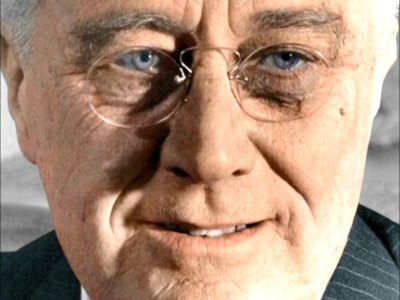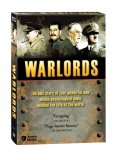| Reviews & Columns |
|
Reviews DVD TV on DVD Blu-ray 4K UHD International DVDs In Theaters Reviews by Studio Video Games Features Collector Series DVDs Easter Egg Database Interviews DVD Talk Radio Feature Articles Columns Anime Talk DVD Savant Horror DVDs The M.O.D. Squad Art House HD Talk Silent DVD
|
DVD Talk Forum |
|
|
| Resources |
|
DVD Price Search Customer Service #'s RCE Info Links |
|
Columns
|
|
|
Warlords
Warlords, the 2005 British television documentary based on the book by Simon Berthon and Joanna Potts, is an exciting look at the psychological "war of the mind" waged by the four great leaders of World War II: Franklin Roosevelt, Winston Churchill, Adolph Hitler, and Joseph Stalin. Warlords isn't like most other war documentaries you'll see on The History Channel or The Military Channel. Great battles aren't discussed and armaments aren't detailed. Instead, the psychologies of these four leaders are examined in relation to their dealings with each other, with the resulting "mind games" largely determining the direction and outcome of the war -- not troop movements or superior fire power. As well, Warlords brings out some rather startling suppositions about the various relationships between these giants of history, relationships that are usually glossed over in other documentaries as black-and-white affairs of mutual distrust or friendship.

Utilizing archival footage manipulated in newly shot live-action sequences (a reoccurring shot involves actors playing the leaders, watching archival footage of their rivals/allies on movie screens in their offices), Warlords contains no "talking heads" experts who may interrupt the flow of the narrative. Moving along more like a fast-paced movie thriller rather than the usual staid documentary, Warlords relies on a terrific spoken narration, along with an ominous musical score, to tell the story of these political leaders, and the constant parry and thrust that went into their negotiations with each other. Taking the printed words of these various warlords, along with written remembrances by top aides and other politicians, Warlords paints a far more complex picture of the nature of allies and enemies during "the good war," World War II.
Warlords's take is that these marriages of convenience between Hitler and Stalin, between Churchill and Roosevelt, and between Stalin, Churchill and Roosevelt, were far more complicated than is usually assumed in the popular mythology. Fraught with paranoia, conspiracy, political jockeying, and above all, distrust, relationships like Stalin's and Hitler's non-aggression pact, which is ever rarely fully explained in other documentaries, is delineated by miscalculation and misreading of motives on both parties' part, while the myth of a close, in-synch relationship between Churchill and FDR, is exposed as something far less admirable.
I'm not an expert on WWII by any means, but some of the revelations in Warlords, while not exactly new, were so convincingly applied that they took on new power and clarity when I watched the show. For example, with many of the documentaries I've seen on WWII, I've never felt that I've received a clear answer on how, exactly, Hitler came to form a pact with his ideological opposite Joseph Stalin. That's not surprising when you consider that most WWII documentaries concern themselves with detailing large-scale battles and troop movements; strategy, and particularly the mindset of the leaders who made that strategy, are rarely if ever looked at in detail. Warlords makes the situation clear through a psychological analysis of the two leaders -- something I've never seen before in a WWII documentary.

Even more fascinating was author Simon Berthon's take (Berthon produced, wrote, and directed this documentary) on FDR's and Churchill's friendship. I was always under the assumption that despite the usual lesser friction caused by two countries working towards a common goal, that Churchill and FDR were of one mind on the abuses of Hitler, and of their need to work together almost right from the start of WWII to defeat him. Or at least that's what I assumed. According to Berthon, FDR had absolutely no intention of ever coming in on the side of England against Hitler, but that his hand was forced by the Japanese's sneak attack on Pearl Harbor (and even after that, he didn't call for war against Germany -- he waited for Hitler to declare war on the U.S.). Apparently, FDR was not all that enamored with Churchill, and throughout their relationship, FDR essentially lied to him to keep him happy -- while keeping the U.S. out of harm's way against the Germans.
Even more unsettling, FDR apparently viewed Stalin's communist land-grabs as far less odious than Churchill's desire to keep the British Empire intact (Churchill's desire to invade the Balkans through the Adriatic to head off Stalin was shot down by FDR, changing the face of Europe for the worse, and resulting in the deaths of millions of people at the hands of Stalin). FDR, according to Berthon, totally misread Stalin, and felt that he could control the psychotic mass-murderer with appeasement and diplomacy. History obviously has already given the verdict on that score, but it may be disturbing for American viewers, accustomed to having historical portraits of FDR that run the range from saint to near god-head, to see just how wrong he was on so many vital political and military points during WWII.
Of course, it's also important to note that Berthon's take is his own, supported by solid evidence, but still, a matter largely of interpretation and in some cases, supposition. Particularly when dealing with Stalin, where official records have disappeared, Berthon is making critical leaps of judgment that, I would imagine, could be argued to the contrary by other historians with other viewpoints. However, there's no denying that Warlords is a fascinating, exciting piece of popular psychology aimed at four of the most influential leaders of the 20th century, and necessary viewing for anyone interested in WWII.

Here are the 4, 50-minute episodes of the two-disc box set, Warlords, as described on their hardcases:
DISC ONE:
Part 1: Hitler vs. Stalin, August 1939 - June 1941
As World War II begins, the two most extreme proponents of totalitarian violence sign a nonaggression pact. Less than two years later, however, the nominal allies turn on each other. The seeds of Hitler's betrayal lie in his psyche: he foolishly believes that he has already won in Western Europe, and he begins to suspect a secret pact between Churchill and Stalin.
Part 2: Churchill vs. Roosevelt, May 1940 - April 1942
During the Battle of Britain, Roosevelt overcomes his long-held dislike of Churchill, inflating his promises of aid and boosting the prime minister's resolve to fight on. All the while, the U.S. President pursues his own self-interested agenda -- to defend his country from Hitler without losing American lives.
DISC TWO:
Part 3: Churchill vs. Stalin, June 1941 - June 1944
As the war grinds on, Stalin pushes his allies to accept the 1941 frontiers, ostensibly for the Soviet Union's security. Churchill, however, interprets Stalin's demands as a land grab. He urges a U.S.-British invasion from the Adriatic through the Balkans not only to attack the Nazis' "soft underbelly," but also to preempt Stalin's postwar plans.
Part 4: Roosevelt vs. Stalin, July 1944 - April 1945
Despite Stalin's ruthless duplicity in refusing to support the Polish underground's uprising in Warsaw, Roosevelt fears Churchill's Old World imperialist tendencies even more than he does apparent Soviet ambitions. The American president aims to moderate the Russian ruler's harshness and seeks compromise, not confrontation, with Stalin.
The DVD:
The Video:
The full screen video image for Warlords looks fine, but I did notice some pixilation and edge enhancement issues. Nothing major, but not pristine, either.
The Audio:
The Dolby Digital English 2.0 stereo mix for Warlords is quite nice, with close-captioning available.
The Extras:
There are no extras for Warlords.
Final Thoughts:
One of the most fascinating documentaries I've ever seen on WWII, Warlords takes the unique approach of examining the psychological "mind games" that the four mighty warlords of WWII -- FDR, Churchill, Stalin and Hitler -- played on each other. Moving and playing more like a fast-paced thriller than a staid documentary, Warlords is essential viewing for anyone interested in 20th century world politics -- and even if you're not, you won't find a more exciting history lesson than Warlords. I highly recommend it.
Paul Mavis is an internationally published film and television historian, a member of the Online Film Critics Society, and the author of The Espionage Filmography.


|
| Popular Reviews |
| Sponsored Links |
|
|
| Sponsored Links |
|
|
| Release List | Reviews | Shop | Newsletter | Forum | DVD Giveaways | Blu-Ray | Advertise |
|
Copyright 2024 DVDTalk.com All Rights Reserved. Legal Info, Privacy Policy, Terms of Use,
Manage Preferences,
Your Privacy Choices | |||||||














